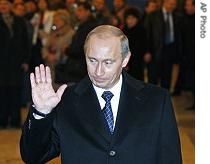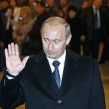
KREMLIN CONTINUES ATTEMPTS TO DIVIDE EUROPE
Publication: Eurasia Daily Monitor Volume: 3 Issue: 209
By:

Trying to create a rift within the European Union, Russia wants the international community to condemn some of the bloc’s new members that allegedly discriminate against certain categories of their own population. According to analysts, big-time geopolitics, including the extremely sensitive issue of energy security, lurk behind the Kremlin’s human rights championing.
On November 7, Russia introduced a draft resolution in the United Nations General Assembly decrying xenophobia and racism. Andrei Nikiforov, a Russian diplomat at the UN in New York, said Moscow’s move was prompted by the tendencies in some unnamed countries to “glorify” the Waffen SS and declare the anniversary dates of their liberation from Nazism to be national days of mourning. Such behavior, he argued, is “absolutely incompatible with the obligations assumed” by those states as UN members.
While the Russia-sponsored document does not name any specific states against which the resolution might be directed, Latvia and Estonia, two new EU entrants, are widely seen as the primary targets of Moscow’s initiative. The Kremlin has long claimed that ethnic Russians, who make up more than a quarter of Estonia and Latvia’s populations, are subjected to unfair treatment due to the Baltic countries’ existing legislation that regulates citizenship and language issues, including the establishment of Russian-language schools. In particular, the Russian minorities in the two Baltic states and the Kremlin leadership have been arguing that the introduction of restrictions on the establishment of schools whose curriculum is taught in a language other than officially sanctioned by the state violates human rights norms.
To be sure, Moscow’s annoyance at the Balts’ perceived discrimination against Russian minorities is not big news. Thus, the timing of Russia’s strongly worded resolution has to be seen within two contexts: Russian domestic politics and Russia’s uneasy relationship with the European Union.
The sad irony of the fact that the resolution condemning racism and xenophobia was presented by a country that has seen the unprecedented rise of these same social phenomena was not lost on most independent observers. A number of Russian commentators warn that the November 4 ultranationalist “Russian March” should not be written off as a defeat for the extremists, even though the turnout in many cities was low and the authorities kept the protests under tight control (see EDM, November 6). Some analysts note that a nationwide nationalist network managed to mobilize hundreds of protesters in many regions across the country despite the efforts of the authorities to thwart the gatherings.
Faced with the rising nationalist wave, the Kremlin appears to be taking advantage of the opportunity to counter Western accusations that it is not doing enough to stem racism in Russia. The aim of the resolution, one commentary suggests, is to indicate that the problems caused by people who have pro-fascist attitudes exist not only in Russia, but in the West also — in particular some countries of “New Europe.”
In one of his recent interviews with the Western press, Vladimir Chizhov, Russia’s ambassador to the EU, claimed that Estonia was being turned into “an SS hall of fame,” with memorials being erected to local soldiers who fought with the Germans against Soviet forces in World War II. “The EU is doing nothing,” Chizhov said.
But the Russian draft should also be seen as the latest in a series of moves by Moscow to split the EU by indirectly calling on its older members to “discipline” the newer ones.
“The EU has become a multi-headed monster that many in Russia don’t comprehend — and the number of heads keeps increasing,” Chizhov complained in another interview. “The EU’s acquisition of the newcomers from the East made things more difficult, because it brought in countries with grievances of the past Soviet era — a hangover from the Cold War and one that extends as far back as the 19th century,” he said. “We supported the accession of these countries to the European Union and we hoped the ‘big brothers’ inside the EU would provide them with a certain calming — even educational — influence,” Chizhov said. “So far this has not produced the changes we were hoping for.”
But it is not just the alleged human rights abuses that bother the Kremlin. The Russian leadership is surely rattled by the Balts’ stubborn blocking of the North European Gas Pipeline (Nord Stream), the Russo-German pet energy project running under the Baltic Sea. The Baltic countries insist that other EU members should respect their position on the issue, as the bloc is currently struggling to forge a unified energy strategy.
The day after Russia offered the draft resolution at the UN, Latvian President Vaira Vike-Freiberga told the Frankfurter Allgemeine Zeitung that Riga still objects to Nord Stream on the grounds that the project ignores the other six countries located on the Baltic Sea and their wishes. After the Ukrainian gas crisis of January 2006 and the recent Russian blockade of Georgia, Vike-Freiberga contended, “Europe has come to understand that it is vulnerable when it is completely dependent [on Russia] in energy matters.”
(RFE/RL, November 8; Itar-Tass, News.ru, November 7; International Herald Tribune, October 18; Financial Times, October 16)




